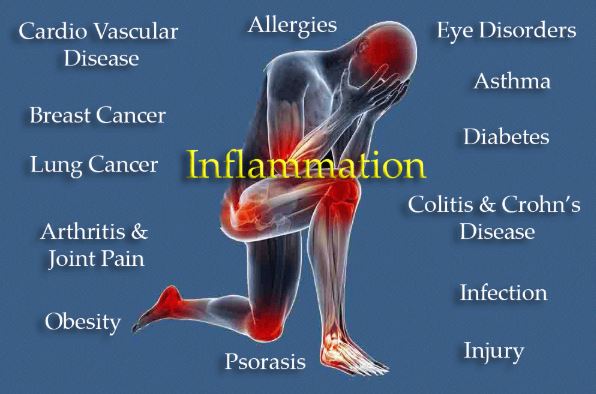How to Reduce Inflammation Naturally: Simple Tips for a Healthier You

Inflammation gets a bad rap, but it’s actually a natural and important part of your body’s immune response. It helps fight off infection, heal injuries, and signal that something needs attention. But when inflammation becomes chronic, it can quietly wreak havoc on your body over time.
🔥 Why Is Chronic Inflammation Bad?
Short-term (acute) inflammation is helpful—like when you get a cut and it swells or turns red. That’s your immune system rushing in to heal. But chronic inflammation is different. It’s a slow, low-level fire that burns quietly in the background, often without obvious symptoms. And over time, it can damage healthy cells, tissues, and organs.
Chronic inflammation has been linked to:
- Heart disease
- Type 2 diabetes
- Obesity
- Autoimmune disorders (like rheumatoid arthritis or lupus)
- Alzheimer’s disease
- Certain cancers
- Digestive issues (like IBS or Crohn’s disease)
- Fatigue, joint pain, brain fog, and mood disorders
In other words, chronic inflammation can age your body from the inside out—and it’s a major root cause behind many of the health issues people face today.
✅ So How Do You Reduce It?
Here are some simple, science-backed ways to cool down inflammation and feel your best:
1. Eat an Anti-Inflammatory Diet
What you eat plays a huge role in inflammation levels. Some foods turn up the heat, while others help cool things down.
Add more of these:
- Leafy greens (spinach, kale, Swiss chard)
- Fatty fish (salmon, sardines, mackerel)
- Berries (blueberries, strawberries, raspberries)
- Nuts and seeds (especially walnuts and flaxseeds)
- Olive oil (extra virgin)
- Turmeric and ginger (natural anti-inflammatories)
Avoid or limit:
- Processed and fried foods
- Added sugar
- Refined carbs (white bread, pastries)
- Red and processed meats
- Trans fats (in packaged snacks)
2. Move Your Body
Regular physical activity helps regulate the immune system and lower inflammation. You don’t need intense workouts—just consistent movement.
Try:
- 30-minute walks
- Gentle yoga or stretching
- Strength training a few times a week
3. Manage Stress
Chronic stress = chronic inflammation. When you’re constantly stressed, your body keeps pumping out cortisol and inflammatory chemicals.
Try:
- Deep breathing or meditation
- Journaling or creative outlets
- Time in nature
- Talking to someone you trust
4. Prioritize Sleep
Your body heals while you sleep. Poor sleep keeps inflammation high and disrupts your hormonal balance.
Tips:
- Aim for 7–9 hours a night
- Limit screens before bed
- Keep a consistent sleep routine
- Create a calm, cool sleep environment
5. Stay Hydrated
Even mild dehydration can stress the body and increase inflammation. Water helps flush out toxins and keeps your systems running smoothly.
Goal:
Drink about half your body weight in ounces of water per day (150 lbs = ~75 oz).
6. Avoid Smoking and Limit Alcohol
Both can trigger inflammation and damage your body at the cellular level. Cutting back—or quitting—makes a big difference in long-term health.
Final Thoughts
Chronic inflammation doesn’t usually show up overnight, and the good news is—it doesn’t have to stay. Small daily habits can cool that internal fire and help you feel better from the inside out. Think of it as long-term self-care that supports your energy, mood, and future health.
